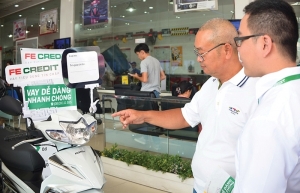Economic conditions taint consumer finance prospects
 |
| Analysts are looking for more professional management of consumer lending activities, photo Le Toan |
FE Credit last week released its financial report for the first six months of 2023, revealing a post-tax loss of $124.5 million, compared to a profit of $5.9 million during the same period the previous year. The return on equity for FE Credit decreased from 0.9 per cent to about minus 29 per cent.
FE Credit’s equity capital as of June 30 also decreased by 35.6 per cent compared to the same period the previous year. Additionally, the company recorded a reduced capital adequacy ratio as per industry regulations, dropping from 23 to 13.89 per cent.
According to analysis by VCBS Securities, FE Credit currently has one of the highest non-performing loan ratios in the consumer finance sector. Meanwhile, VNDirect suggests that the unfavourable economic conditions have affected low-income customers, who comprise a significant portion of FE Credit’s clientele. VNDirect projects a 5 per cent loan growth for FE Credit in 2023 and a pre-tax loss of approximately $29 million.
During VPBank’s AGM, the bank’s leadership acknowledged that 2023 would continue to be a challenging year for FE Credit, its parent company, especially the first six months.
“FE Credit’s operations are anticipated to gradually stabilise and turn profitable in the last six months of 2023. While loan growth is expected to slow down, the focus will be on customers with lower risk profiles,” a VPBank representative said.
Meanwhile, VietCredit reported an accumulated loss of $3 million for the first six months of the year in its semi-annual financial report.
The reason given is a decrease in revenue from credit card issuance activities, while the company’s borrowing costs increased. The company’s bad debt ratio also surged to 20.2 per cent at the end of the second quarter of 2023, whereas at the end of last year, this ratio was only 11.9 per cent.
The profitability of various other consumer finance firms such as Mcredit, HD Saison, VNFinance, and others has also witnessed a notable decline.
Another notable case is Home Credit, which reported a profit of over $8.7 million for the first six months of the year, less than half of the same period last year. As of late August, Kasikornbank, the second-largest bank in Thailand, was negotiating to acquire Home Credit with an estimated transaction value of $1 billion.
If successful, this deal will be the second-largest of its kind in the Vietnamese consumer finance industry, only surpassed by the sale of FE Credit’s $1.4 billion equity capital to Japan’s Sumitomo Mitsui Banking Corporation in 2022.
Nguyen Quoc Hung, secretary-general of the Vietnam Banks Association (VNBA), noted that now is the most challenging period for finance companies, after being hit by the pandemic and the lingering economic difficulties from last year, particularly in debt collection.
“The rate of customers failing to repay loans, and even jointly accumulating debt, is increasing, while measures against these customers are not yet in place. Legal action against these customers is also challenging due to the generally low value of the debts,” he said. “In this context, financial companies are cautious about providing consumer loans due to the difficulties in debt recovery.”
According to VNBA data, by the end of 2022, the non-performing loan ratio for financial companies increased by 23.09 per cent compared to the previous year and is expected to continue rising.
A senior lawyer emphasised that based on recent developments in the consumer lending market, regulatory authorities need to separate debt collection activities from wrongful practices, and normalise debt recovery services.
“The management of these activities should be professionalised, instead of imposing bans. Approval for debt recovery as an official service, regulated by the law, is necessary to protect both borrowers and lending businesses,” the lawyer said.
According to him, in principle, all organisations and individuals should be equal before the law, and protecting the people, specifically borrowers, is essential to ensure compliance with legal regulations. However, it is also crucial to protect both borrowers and pawnshop service providers, which includes lending businesses.
“The issue currently faced by the entire consumer finance sector is the legal aspects of debt recovery,” he added.
| There are currently 16 financial companies licensed by the State Bank of Vietnam, with a total outstanding debt of over $9 billion by the end of 2022, accounting for 1.87 per cent of the total economic debt and 8.5 per cent of the consumer lending debt nationwide. |
 | Consumer finance groups tap new funds International expertise and solid financial support are vaulting some consumer finance companies in Vietnam ahead of their peers, and also presenting opportunities for both sides to deploy excess capital and diversify their business. |
 | Consumer finance in major tie-up tendency The pandemic-triggered turbulence continues to gnaw at the consumer finance industry in Vietnam, but some players are exploring potential new approaches to the challenges, particularly from some international investors. |
 | Financial groups step up quality drive to improve operations Financial companies in Vietnam are scrambling to adapt to socioeconomic changes in order to survive and thrive. |
What the stars mean:
★ Poor ★ ★ Promising ★★★ Good ★★★★ Very good ★★★★★ Exceptional
Related Contents
Latest News
More News
- Raised ties reaffirm strategic trust (February 20, 2026 | 14:06)
- Sustained growth can translate into income gains (February 19, 2026 | 18:55)
- The vision to maintain a stable monetary policy (February 19, 2026 | 08:50)
- Banking sector faces data governance hurdles in AI transition (February 19, 2026 | 08:00)
- AI leading to shift in banking roles (February 18, 2026 | 19:54)
- Digital banking enters season of transformation (February 16, 2026 | 09:00)
- IFC to grant $150 million loan package for VPBank (February 13, 2026 | 09:00)
- Nam A Bank forms position as strategic member at VIFC through three key partnerships (February 12, 2026 | 16:39)
- Banks bolster risk buffers to safeguard asset quality amid credit expansion (February 12, 2026 | 11:00)
- VNPAY and NAPAS deepen cooperation on digital payments (February 11, 2026 | 18:21)

 Tag:
Tag:



















 Mobile Version
Mobile Version